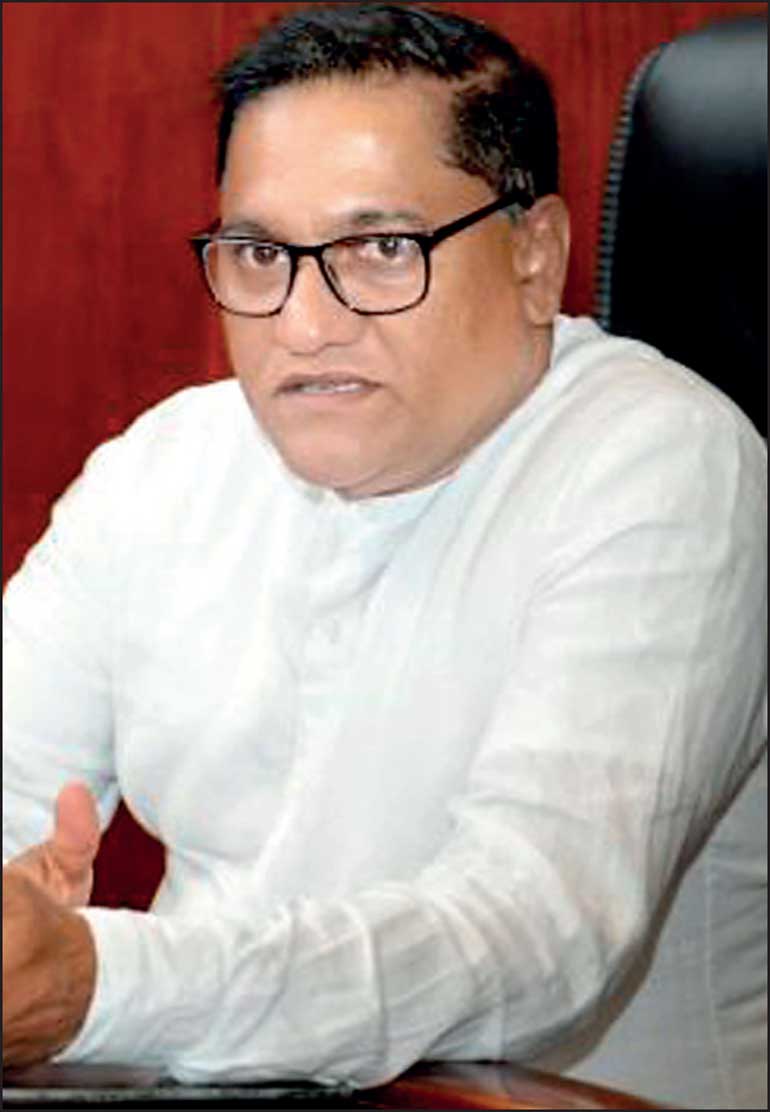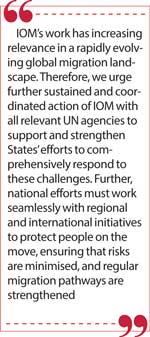Saturday Feb 21, 2026
Saturday Feb 21, 2026
Saturday, 30 November 2024 00:00 - - {{hitsCtrl.values.hits}}

Foreign Affairs, Foreign Employment and Tourism Minister Vijitha Herath
Foreign Affairs, Foreign Employment and Tourism Minister Vijitha Herath, in a recorded video message to the High-Level Segment of the 115th Session of the International Organization for Migration (IOM) Council on 26 November 2024, stressed the importance of ensuring safe, orderly, regular, rights-based migration.
The High-Level Segment of the IOM was themed: ‘Regular Migration Pathways: A Global Call for Action’, and the 115th Session of the Council was held in Geneva from 26-28 November.
Excerpts from Minister Herath’s speech is as follows:
 Migration has been a part of human existence for centuries. Today, people migrate voluntarily, primarily for work, or are compelled to do so due to natural disasters, climate change, conflict, and economic instability. In the process, they increasingly resort to irregular pathways of migration, risking their lives, and often falling victim to human trafficking.
Migration has been a part of human existence for centuries. Today, people migrate voluntarily, primarily for work, or are compelled to do so due to natural disasters, climate change, conflict, and economic instability. In the process, they increasingly resort to irregular pathways of migration, risking their lives, and often falling victim to human trafficking.
The real impact of the effects of climate change, conflict situations around the world, and economic compulsions driven by debt crises, on irregular movements has a heavy toll on the most vulnerable, particularly women and children.
IOM’s work has increasing relevance in a rapidly evolving global migration landscape. Therefore, we urge further sustained and coordinated action of IOM with all relevant UN agencies to support and strengthen States’ efforts to comprehensively respond to these challenges. Further, national efforts must work seamlessly with regional and international initiatives to protect people on the move, ensuring that risks are minimised, and regular migration pathways are strengthened.
As a receiving, transit, and sending State pertaining to migration, Sri Lanka has been at the forefront of promoting safe, orderly and regular migration pathways through national, regional and international initiatives. Since migrants are human beings and migration must be rights-based, Sri Lanka has been at the forefront of promoting rights-based migration, internationally. Sri Lanka is one of the 60 States Parties to the International Convention on the Protection of the Rights of All Migrant Workers and Members of Their Families.
In this context, Sri Lanka underscores the significance of the Global Compact for Safe, Orderly and Regular Migration (GCM) adopted by the UN General Assembly in 2018. Its 23 objectives cover almost all dimensions of migration.
I am pleased to inform that Sri Lanka is interested in becoming a GCM Champion Country, reinforcing our commitment to the GCM agenda on facilitating safe, orderly and regular migration.
As a precursor to the 2nd Asia-Pacific Regional Review of the GCM to be held in February 2025 in Bangkok, Sri Lanka and IOM recently co-hosted the South Asia Sub-Regional Consultation on the GCM. Focusing on three key areas of significance to South Asia – (1) labour migration; (2) counter-trafficking; and (3) climate-induced displacement; the consultation served as a valuable platform for dialogue and deliberation among Governments and civil society from South Asian countries as well as multiple local stakeholders and UN agencies, which will be reported in an outcome document for the upcoming regional review in Bangkok.
Sri Lanka, as the founding chair of the Colombo Process, a regional consultative process established in 2003, has been committed to enhancing regional cooperation, promoting the sharing of best practices related to labour migration in countries of origin of South and South-East Asia.
In response to the rapidly evolving global context, Sri Lanka launched its National Policy and Action Plan on Migration for Employment 2023-2027 last year, aligning with the implementation of the GCM.
Sri Lanka appreciates the valuable support provided by IOM, through its Sri Lanka country office, which continues to strengthen the development and implementation of Sri Lanka’s national policies on migration contributing to sustainable development and importantly, a rights-based approach to migration.
In conclusion, I reiterate Sri Lanka’s commitment to working in cooperation with the IOM, as well as regional, and international stakeholders, for ensuring safe, orderly, regular, and rights-based migration beneficial for all.